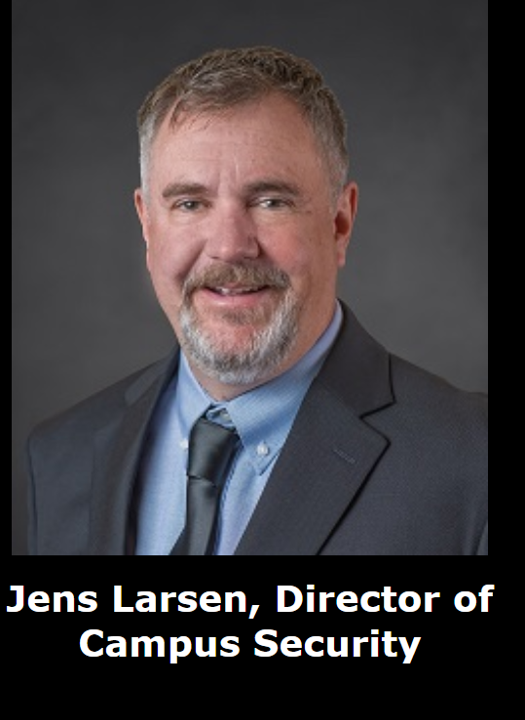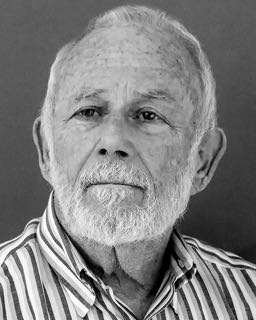SAFETY AND SECURITY AT RVM
By Bob Buddemeier
Take about a square mile of real estate located within a small city that is bisected by a major interstate and located in an area prone to wildfires, storms, and occasional Great Earthquakes. Populate it with about 850 senior citizens representing almost the complete spectrum of mental and physical conditions, and stir in some fraction of the >500 employees (exact number dependent on day and time). What could go wrong?
Well, almost anything. That’s why RVM has a professionally staffed Department responsible for Security and Emergency Preparedness, plus an extensive resident volunteer organization (RPG — the Residents Preparedness Group) designed to back up the Security Department in case of a protracted emergency or overwhelming disaster.
 The Department of Campus Security is led by Director Jens Larsen (who is usually addressed as Jens-with-a-J, but will answer to the more ethnically authentic Yens). In addition to Jens, the Department consists of 10 full-time employees and two on-call backups who fill-in for staff absences. All Security employees have Oregon State certification, as well as certification in First Aid, CPR, and defibrillator use (AED).
The Department of Campus Security is led by Director Jens Larsen (who is usually addressed as Jens-with-a-J, but will answer to the more ethnically authentic Yens). In addition to Jens, the Department consists of 10 full-time employees and two on-call backups who fill-in for staff absences. All Security employees have Oregon State certification, as well as certification in First Aid, CPR, and defibrillator use (AED).
Jens, who has been at RVM since 2018, has accumulated 25 years of Security work experience since he started with part- time work while completing his Bachelor’s degree in political science. He has also completed numerous training courses and received certifications from FEMA and the State of Oregon.
All department members must have basic Security Officer Certification from the Oregon Department of Public Safety, as well as certification in First Aid, CPR, and defibrillator use (AED). Department employees may also have additional experience and qualifications – for example, two are currently enrolled in an EMT training program.
The Department has Shift Leaders (day and night), and 3-4 staff members on campus, depending on time of day. There is always a dispatcher on duty to receive calls, monitor alarms and cameras, and direct responses. Duty officers patrol the campus regularly, looking out for potential problems.
The security department serves us well in the normal course of events, but 10 people would be spread pretty thin (even if all were present) during a major disaster like a large earthquake, or a long term emergency like a protracted regional power outage.

Bob Berger, RPG Chaiur
The Residents Preparedness Group (RPG) is a Select Committee of the Residents Council. Bob Berger is the current Chair, Linda Spence (RN) is the Medical coordinator, and Dan Curtis manages the radio communication activities. The organization of resident volunteers has been established to provide some critical backup functions in case Security personnel are overloaded by events. The primary RPG mission is communication support. None of the RVM communication avenues reliably reach everybody, and in case of a major power outage, all of them could be shut down or seriously compromised.
RPG is organized with one or more “coordinators” in each cottage neighborhood and on every high-rise floor. They are equipped with hand-held radios, and in the event of a major emergency they would go door to door to deliver messages as required, checking for damages, injuries or other problems. The neighborhood and floor coordinators report to (and receive instructions from) a smaller group of Area coordinators, who are in radio communication with the resident radio room. From there, information is exchanged with the RVM Incident Commander or Administration in order to coordinate the best use of available resources.
Although the only requirement placed on the Neighborhood/floor coordinators is their communication function, it is expected that they will be familiar with the residents in their areas of responsibility so that they would know, for example, who would need assistance if an evacuation is ordered.
Fortunately, a substantial number of volunteers have experience in medical or emergency service, and RPG has been building in a growing first aid response capability. This involves positioning first-aid packs around campus in locations accessible to coordinators and other volunteers, and offering classes in First Aid and CPR.
The resident population in general (= you) — Ideally, everybody’s safety is everybody’s business. We hope that everyone will familiarize themselves with the people and procedures organized to keep campus and residents safe and secure. Sources of information are presented at the end of this article. If you are willing and able to contribute to the efforts, talk to Bob Berger or your local are/neighborhood/floor coordinator.
Finding Information about Security on MyRVM




Leave a Reply
Want to join the discussion?Feel free to contribute!